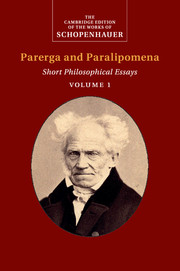Book contents
- Frontmatter
- Contents
- General Editor’s Preface
- Editorial Notes and References
- Introduction
- Notes on Text and Translation
- Chronology
- Bibliography
- Parerga and Paralipomena: Contents
- Preface
- Sketch of a History of the Doctrine of the Ideal and the Real
- Fragments for the History of Philosophy
- On University Philosophy
- Transcendent Speculation on the Apparent Deliberateness in the Fate of the Individual
- Essay on Spirit-Seeing and Related Issues
- Aphorisms on the Wisdom of Life
- Chapter I Fundamental Division
- Chapter II What One Is
- Chapter III What One Has
- Chapter IV What One Represents
- Chapter V Counsels and Maxims
- Chapter VI On the Different Stages of Life
- Versions of Schopenhauer’s Text
- Glossary of Names
- Index
Chapter IV - What One Represents
Published online by Cambridge University Press: 30 June 2022
- Frontmatter
- Contents
- General Editor’s Preface
- Editorial Notes and References
- Introduction
- Notes on Text and Translation
- Chronology
- Bibliography
- Parerga and Paralipomena: Contents
- Preface
- Sketch of a History of the Doctrine of the Ideal and the Real
- Fragments for the History of Philosophy
- On University Philosophy
- Transcendent Speculation on the Apparent Deliberateness in the Fate of the Individual
- Essay on Spirit-Seeing and Related Issues
- Aphorisms on the Wisdom of Life
- Chapter I Fundamental Division
- Chapter II What One Is
- Chapter III What One Has
- Chapter IV What One Represents
- Chapter V Counsels and Maxims
- Chapter VI On the Different Stages of Life
- Versions of Schopenhauer’s Text
- Glossary of Names
- Index
Summary
This, our existence in the opinion of others, isconsistentlymuch overrated as a result of aparticular weakness of our nature, although theslightest reflection could teach us that in itself,for our happiness, it is not essential. Accordingly,it is hard to explain how inwardly glad all humanbeings are as soon as they detect signs of others’favourable opinion and their vanity is somehowflattered. As inevitably as a cat purrs whenstroked, sweet bliss is painted on the faces of thepeople whom we praise, and specifically in thesphere of their pretensions, even if the complimentis a palpable lie. Often signs of the applause ofstrangers console them for real misfortune or forthe scantiness with which the twomain sources ofhappiness flow for them that we have discussed sofar; and, conversely, it is astonishing how everyinjury of their ambition, in any sense, to anydegree, or in any relation, every contempt,disregard, or disrespect hurts them without fail andoften deeply pains them. Since the feeling of honouris based on this quality, it might have beneficialresults for the good conduct of many, as asubstitute for their morality. However, its effectson the personal happiness of people, and first of all onthe tranquillity and independence so essential toit, are more disruptive and detrimental thanadvantageous. Therefore, it is advisable from ourpoint of view to limit it and, by means of properdeliberation and correct assessment of the value ofthe goods, to moderate this great susceptibility tothe opinions of others as much as possible, not onlywhere it is flattered, but also where it isoffended; for both hang from the same thread.Otherwise, we remain the slaves of the opinion andconcerns of others:
So slight, so insignificant is what undermines orrestores the spirit that thirsts for praise.
Accordingly, a correct comparison of the value of whatwe are in and forourselves with what we are in the eyesof others, willgreatly contribute to our happiness. To the formerbelongs all that fills the entire span of our ownexistence, its inner content, hence all the goodsthat we have considered under the names of ‘what oneis’ and ‘what one has’. For the place where all ofthis is effective is our own consciousness.
- Type
- Chapter
- Information
- Schopenhauer: Parerga and ParalipomenaShort Philosophical Essays, pp. 309 - 354Publisher: Cambridge University PressPrint publication year: 2014

